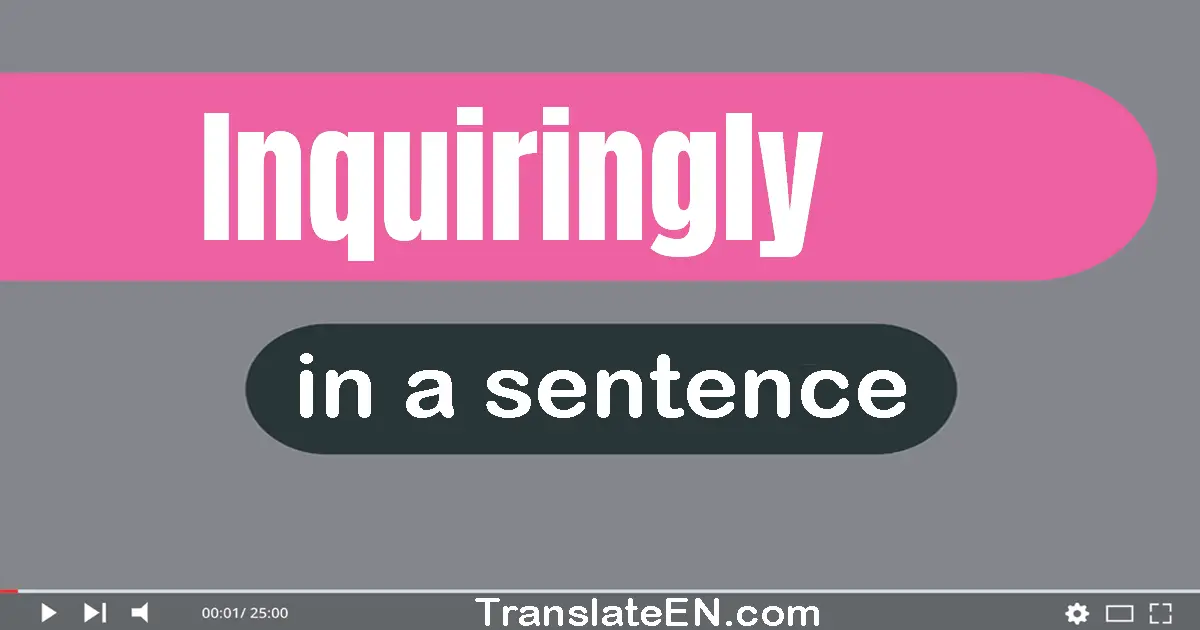Inquiringly in a sentence
Synonym: curiously, questioningly. Antonym: indifferently
Meaning: In a manner that shows curiosity or questioning; significant in communication.

(1) She looked at him inquiringly, waiting for an answer.
(2) He tilted his head inquiringly, wondering what she meant.
(3) The teacher asked the student inquiringly if they understood the lesson.
(4) The detective raised an eyebrow inquiringly, trying to get more information.
(5) The journalist asked the politician inquiringly about their stance on the issue.
(6) The customer looked at the salesperson inquiringly, wanting to know more about the product.
(7) The doctor raised an eyebrow inquiringly, asking the patient if they had any other symptoms.
(8) The audience member leaned forward inquiringly, trying to catch every word of the speaker's presentation.
(9) The child looked up at their parent inquiringly, wanting to know why they couldn't have ice cream for dinner.
Inquiringly meaning
Inquiringly is an adverb that describes the manner in which someone is asking a question or seeking information. It is often used to convey a sense of curiosity or interest in a particular topic. If you are looking to incorporate this word into your writing, there are a few tips that can help you use it effectively. First and foremost, it is important to understand the meaning of inquiringly and how it can be used in a sentence. This word is typically used to describe the way in which someone is asking a question or seeking information.
For example, you might say that someone looked at you inquiringly if they were trying to figure out what you were thinking or feeling. When using inquiringly in a sentence, it is important to consider the context in which it is being used. This word is often used to convey a sense of curiosity or interest, so it is important to make sure that the sentence reflects this.
For example, you might say "She looked at him inquiringly, wondering what he was thinking," to convey a sense of curiosity about the other person's thoughts or feelings. Another tip for using inquiringly effectively is to pay attention to the tone of the sentence. This word can be used to convey a variety of emotions, including curiosity, suspicion, or even skepticism. Depending on the context of the sentence, you may want to adjust the tone to reflect the appropriate emotion.
For example, you might say "He asked inquiringly, trying to get to the bottom of the mystery," to convey a sense of suspicion or skepticism.
Finally, it is important to remember that inquiringly is an adverb, which means that it should be used to modify a verb or adjective in the sentence. This can help to clarify the meaning of the sentence and make it more effective.
For example, you might say "She looked at him inquiringly, hoping to get a better understanding of his thoughts," to clarify the purpose of the inquiring look.
In conclusion, inquiringly is a useful word that can be used to convey a sense of curiosity or interest in a particular topic. When using this word in a sentence, it is important to consider the context, tone, and purpose of the sentence to ensure that it is used effectively. By following these tips, you can use inquiringly to enhance your writing and convey your message more effectively.
The word usage examples above have been gathered from various sources to reflect current and historical usage of the word Inquiringly. They do not represent the opinions of TranslateEN.com.
